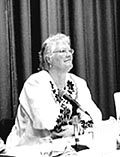

Looking through the Oberlin College viewbook, it seems that we've done pretty well in producing lawyers, computer analysts and bureaucrats.
But the list of notables is more diverse than that. One particularly shining star is Eduardo Shivambo Mondlane, OC '53. A conference organized by Emeritus Professor of Sociology Albert McQueen was held last Friday and Saturday to honor Oberlin's forgotten son.

Mondlane, who was killed in a terrorist letter bomb attack in 1969, was a major influence in Mozambique's independence movement.
Despite his wide world of experience, Mondlane's wife Janet Mondlane, said Oberlin remained "one of Eduardo's favorite places."
The first in the series of public events was a speech given at First Church by Dr. Leonardo Santos Simao, Minister of Foreign Affairs and Cooperation of the Republic of Mozambique.
Simao's speech discussed Mondlane's legacy and beliefs. "Mondlane always dreamed of education for all his people in order to help them face the challenges of civilization," he said.
Today, however, about 50 percent of Mozambican schools have been destroyed in a long civil war. The literacy rate in Mozambique is 58 percent for males and 23 percent for females.
Simao told the crowd that any offer of support to help Mozambican students come to Oberlin would be greatly appreciated. "Education is the most powerful weapon for the people's liberation," said Simao. "Where would America stand today if leaders like Martin Luther King Jr. had not used education to fight against such evils as segregation?"
Dr. Herbert Shore, professor emeritus at the University of Southern California, read poetry and prose dedicated to Mondlane and announced that he had donated a valuable personal collection of materials on Mondlane and Mozambique to Oberlin College. The collection will be kept in Mudd Library and be made available to students for research.
Saturday morning a symposium was held to discuss memories of Mondlane, followed by a panel discussion.
Moderated by Prexy Nesbitt, dean of students at Francis Parker School, the panel consisted of Modlane's friends and political contemporaries: Darrell Randall, George Houser, Edward Hawley, OC '53, Elliott Skinner, and Shore.
Among other things, the panel discussed Mondlane's life at Oberlin. He had deep ties to the Church while attending school here, for which students on campus scorned him.
It was the Church, however, that had sent Mondlane to Oberlin. Protestant missionaries in Mozambique arranged a scholarship for him to study in America after he received ill treatment as an African student in South Africa and at Lisbon University.
Houser said Mondlane also came to America in order to avoid the police of Portugal. "They followed him to America, offering him a teaching job in Portugal. They didn't want him in Mozambique or America."
In 1961, Mondlane left America for Mozambique in order to devote all his time and energies to his country.
The Front for Mozambican Liberation (FRELIMO), a guerrilla organization, was founded in 1962 with Mondlane as its president.
An armed resistance began against the Portuguese in 1965. "[Mondlane] came to feel that there is a point when violence is necessary," said Hawley.
By 1968 northern Mozambique had been liberated. According to Darrell Randall, Mondlane's movement was so successful because he could win friends easily. During the Cold War, for example, he was receiving support from China, the Soviet Union, Britain and the United States.
Not everyone was swayed by Mondlane's friendly demeanor. He was accused of being both an American and Communist stooge, and Newsweek reported that he was living in a mansion off the funds dedicated to the movement.
Mondlane did not live in a mansion, but did not move to refute the statements. However, he was obviously not looking for fame nor wealth. He once said to Shore, "Can you imagine me coming out on a balcony with the crowd with them shouting 'Mondlane! Mondlane!' I could never handle it."
Mondlane was assassinated in 1969 by a mail bomb. Randall acknowledged that this was a serious blow to the people, but stated that the struggle was able to move on because it did not center around one person, a testament to Mondlane's organizing skills.
In 1974 the Portuguese government withdrew and Mozambique became independent. Simao stated in his speech, "Mondlane may rest in peace, for his efforts have been vindicated."
The state of present day Mozambique was the topic of discussion in the third session Saturday afternoon.
A major theme of the discussion was Mozambique's current economic depravity.
"If a nation is to grow and govern itself, we have to know who we are," said Janet Mondlane, "and we don't know who we are." There are about 30 different languages spoken in the country, and the different peoples don't understand each other, so it is hard for them to work together on any issue. Its multi-party democracy, formed in 1994, draws only 14.5 percent of the 17.5 million people to vote.
At an open discussion on Saturday night, people displayed a feeling of, 'What's next? How can we help the situation in this country?'
One issue brought up in this and other sessions was debt forgiveness. During the struggle for independence, Mozambique had to appeal to other countries for aid. A committee was formed to work on a plea to the U.S. government to forgive the debt of Mozambique, and a proposal was drafted.
Though there is a plaque in Peters Hall dedicated to Mondlane, Oberlin seems to have all but forgotten him. At the final meeting, the group decided to charter an American branch of the Eduardo Chivambo Mondlane Foundation, a Mozambican organization, here in Oberlin.
The purpose of the group is to increase awareness of Mondlane and the situation in Mozambique today. Four Oberlin College students agreed to help charter the group under the leadership of Shore.
Janet Mondlane: The wife on the slain leader spoke at last weekend's conference. (photo by Heidi Good)
Copyright © 1998, The Oberlin Review.
Volume 127, Number 6, October 9, 1998
Contact us with your comments and suggestions.